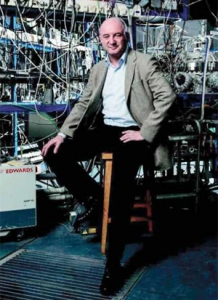Professor Daniel Zajfman is the youngest president of the renowned Weizmann Institute of Science in the history of the research institute. Since the 47-year old physicist took over in 2006, the institute became more renowned and more international than ever before. We spoke with Professor Zajfman about Israeli science and his work as president.
Interview by Katharina Höftmann
Israel Between the Lines (IBTL): It is quite remarkable that so many Nobel Prize winners are from Israel – what is the secret of their success?
Prof. Zajfman: It is the freedom of thought. Israelis lack respect of authorities – however, in science this is a great attribute. As professor I wish for students who don’t show too much respect. If they are too respectful, if they are too scared to disagree or to challenge me with questions – new ideas can’t be developed. The art of questioning is deeply rooted in the Jewish culture – and it helps us until today!
Another aspect is that we only support the most outstanding ideas. You never know who is going to discover something – therefore we don’t distribute our money by checking who researches but how they research. I don’t believe that Israeli scientists are in any way better or worse than others. However, they have more flexibility and freedom than many of their international colleagues.

IBTL: Would you say that in Israel more smart people stay in science compared to the US where many end up in industries like finance?
Prof. Zajfman: Indeed, it used to be like this, however nowadays it is more about money in our modern society. Young people have the opportunity to find many interesting and also new industries. This is surely something we also recognize in science – for example when we don’t have enough young people who are interested in maths or physics.
IBTL: What do you do to steer them back to the sciences?
Prof. Zajfman: We at the Weizmann-Institute have many programmes to counter this problem. For example with ‘Science Education’ we conduct more than 70 initiatives to introduce pupils and the public to research. Every year more than 50 000 pupils take part! People tend to believe that research is something extremely complicated, however it only depends on how you approach it.
IBTL: Would you say that Israel is suffering from the symptom of Brain Drain as well?
Prof. Zajfman: Yes and no. Let’s see, if people have the choice between the Weizmann Institute and Boston, most of them would opt for Boston. We need to focus more on ‘Brain Import’. Most scientists at our institute are from Israel. We lack a bit of global variety and this could become a problem in 20 to 30 years.

Boycotts kill critical thinking
IBTL: So what do you do to attract international researchers?
Prof. Zajfman: We heavily invest in exchange programmes. At the moment we employ around 60 international researchers but we aim to increase this number. And in fact, it has been increasing over the past years.
IBTL: Despite calls for boycotts against Israel?
Prof. Zajfman: I am not sure it happened because or despite those calls for boycott – we don’t really feel them at all. The number of scientists who want to work for us is rising and we never had someone decline an invitation because of this. In fact: Sciences are the best way to communicate! Boycotts kill critical thinking.
Science would be better with more women
IBTL: It is no secret that there aren’t enough women in science. In what way is the Weizmann Institute addressing this problem?
Prof. Zajfman: First of all – I do believe that science would be better if we had more female researchers. The basis is the variety in thinking and solving problems. Men and women are different and thus don’t have the same needs.
It is a fact that for many women motherhood is an important part of their lives. We address this by providing better conditions for working mothers. If we look at the number of graduates we see that around 45% are women. However, to be successful in our industry, you need to be willing to go abroad and only few women want to have this change of environment with their families. We do support them actively so that they don’t shy away from this decision. After they return from abroad, around 80% are able to find a research position in Israel.
IBTL: Wouldn’t be a women’s quota a considerable option?
Prof. Zajfman: I don’t believe in quotas. We simply need to provide more and better opportunities for women in science. Women need to feel welcomed in science! This is a difficult procedure but if we don’t achieve this, we are going to have to face a huge problem.
The world owes a lot to science.
IBTL: The Weizmann Institute cooperates with many companies, among them the pharmaceutical company Merck. How would you describe the influence of science on the commercial industry?
Prof. Zajfman: Well, I am not saying that I am objective here since I am a researcher myself. However, I do believe that science has been guiding and supporting our societies for a few thousands of years. Just imagine a world without the invention of fire, electricity and so on? Life expectancy has doubled in the past decades and all this is due to research. And of course it is an important accelerator for the industry. Just think of our world, natural resources are not sufficient to become a rich country. Just the opposite is true and Israel is a fabulous example for the rise of wealth through education.
IBTL: Many researchers found their own start-up companies in Israel. In which areas is the Weizmann Institute at the moment particularly successful?
Prof. Zajfman: We have a few milestone breakthroughs in cancer research and many new ideas are born. We invest a lot into cancer research. Another rising field is ‘big data’, the processing and usage of mass data. Also quantum physics is turning ideas into reality that were unthinkable 20 years ago.

IBTL: Do you feel supported by the Israeli government?
Prof. Zajfman: In the last few years massive investments in higher education did take place – I would say, financing has improved and I hope that it’ll continue. Nobody will ever tell you that it’ll be enough.
IBTL: Prof. Zajfman, thank you very much for this interview.
The physicist Daniel Zajfman was born in Belgium and studied in the Technion in the 1970s. Today he is the president of the Weizmann Institute of Science. (Credit: Weizmann Institute)
More information:









